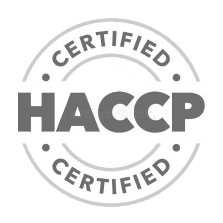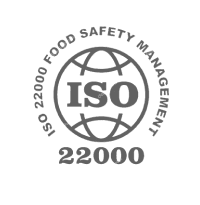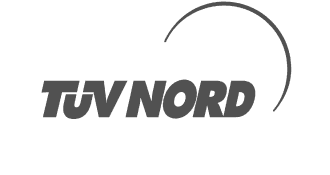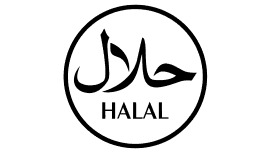Muscle Gain Diet Plan With 7 Day Meal Planning
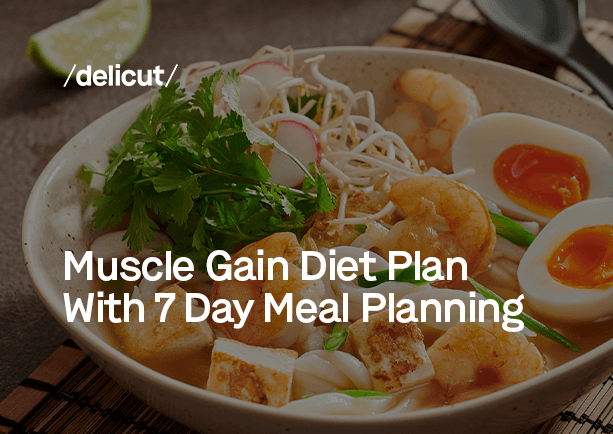
Embarking on a journey to gain muscle is not merely a physical endeavor; it's a harmonious fusion of science, nutrition, and dedication. Welcome to our guide, where we unravel the secrets of a robust muscle gain diet plan strategically designed for a transformative 7-day experience.
In the world of fitness, what you eat is as crucial as how you train. This blog is your compass in the nutritional landscape, providing a meal plan and a comprehensive approach to fueling your muscles for growth.
Let's dive into the intricacies of macronutrients, meal prep mastery, and the art of sculpting a physique through a week-long culinary adventure.
Understanding Muscle Gain
Muscle gain isn't a mysterious process; it's a science. To embark on a successful journey, it's vital to comprehend the fundamental principles. Understanding these key concepts will empower you to make informed choices as you navigate through your personalized meal plan for mescle gain. Let's sculpt that physique!
-
The Role of Protein:
Protein is the building block of muscles. Essential for repair and growth, your daily intake must align with your body weight and activity level.
-
Caloric Surplus:
To gain muscle, you need to consume more calories than you burn. This surplus provides the energy needed for intense workouts and supports muscle recovery.
-
Strength Training:
Resistance or strength training is the catalyst for muscle growth. Structured workouts that target different muscle groups are essential.
-
Rest and Recovery:
Muscles grow during periods of rest. Ensure adequate sleep and incorporate rest days into your routine to optimize recovery.
Key Nutrients for Muscle Gain
Fueling your body for muscle gain requires a strategic approach to nutrition. Understanding how these nutrients work synergistically is pivotal in crafting a meal plan for muscle gain. Here are the key nutrients that play a crucial role in supporting muscle growth:
-
Protein:
As mentioned earlier, protein is the cornerstone of muscle gain. It provides amino acids, the building blocks of muscles. Include lean sources like chicken, fish, tofu, and legumes in each meal.
-
Carbohydrates:
Carbs are your body's primary energy source. Opt for complex carbohydrates such as whole grains, brown rice, sweet potatoes, and oats to sustain energy levels during workouts.
-
Healthy Fats:
Don't shy away from fats; they are essential for hormone production. Incorporate sources like avocados, nuts, seeds, and olive oil into your meals.
-
Vitamins and Minerals:
Ensure your diet is rich in vitamins and minerals, especially vitamin D, calcium, and magnesium. These play vital roles in bone health and muscle function.
-
Hydration:
Often overlooked, proper hydration is crucial for optimal muscle function. Water aids in nutrient transportation and supports overall performance.
The 7-Day Meal Plan for Muscle Gain
Embarking on a journey to build muscle requires not just dedication in the gym but also precision in the kitchen. Let’s break down a comprehensive customized 7-day meal plan tailored for optimal muscle gain:
Day 1: Protein-Packed Start
- Breakfast: Scrambled eggs with spinach and whole-grain toast.
- Snack: Greek yogurt with a handful of almonds.
- Lunch: Grilled chicken breast with quinoa and roasted vegetables.
- Snack: Protein smoothie with banana, protein powder, and almond milk.
- Dinner: Baked salmon with sweet potato and steamed broccoli.
Day 2: Carb Cycling Focus
- Breakfast: Oatmeal with berries and a scoop of protein.
- Snack: Apple slices with peanut butter.
- Lunch: Brown rice with lean ground turkey and mixed vegetables.
- Snack: Cottage cheese with pineapple chunks.
- Dinner: Stir-fried tofu with brown rice and asparagus.
Day 3: Healthy Fats Integration
- Breakfast: Avocado toast with poached eggs.
- Snack: Handful of mixed nuts.
- Lunch: Quinoa salad with chickpeas, feta cheese, and olive oil.
- Snack: Greek yogurt parfait with granola and berries.
- Dinner: Grilled shrimp with quinoa and sautéed zucchini.
Day 4: Nutrient-Rich Choices
- Breakfast: Whole-grain pancakes with a side of Greek yogurt.
- Snack: Celery sticks with hummus.
- Lunch: Lentil soup with a side of whole-grain roll.
- Snack: Protein bar and a banana.
- Dinner: Turkey meatballs with whole-grain spaghetti and tomato sauce.
Day 5: Power-Packed Options
- Breakfast: Spinach and mushroom omelet with whole-grain toast.
- Snack: Orange slices with a handful of walnuts.
- Lunch: Quinoa-stuffed bell peppers with ground beef.
- Snack: Cottage cheese with sliced strawberries.
- Dinner: Baked cod with quinoa and roasted Brussels sprouts.
Day 6: Lean Proteins Rule
- Breakfast: Protein smoothie with kale, banana, and protein powder.
- Snack: Rice cakes with almond butter.
- Lunch: Grilled chicken salad with mixed greens and balsamic vinaigrette.
- Snack: Mixed berries with cottage cheese.
- Dinner: Baked tilapia with sweet potato wedges and steamed green beans.
Day 7: Balanced Indulgence
- Breakfast: Whole-grain waffles with strawberries and a dollop of Greek yogurt.
- Snack: Trail mix with a variety of nuts and dried fruits.
- Lunch: Quinoa bowl with black beans, corn, avocado, and salsa.
- Snack: Protein pudding with sliced kiwi.
- Dinner: Beef stir-fry with brown rice and snap peas.
Conclusion
Congratulations on taking the first steps toward sculpting a physique that mirrors your dedication and hard work in the gym. This 7-day meal plan for muscle gain is not just about calories and macronutrients; it's a roadmap to achieving your fitness goals.
Remember, building muscle is a journey, not a sprint. Consistency in your workout routine and commitment to the nutrition outlined in this plan will be your greatest allies. Listen to your body, make adjustments as needed, and celebrate the small victories along the way.
FAQs
1. What are the key components of a muscle gain diet plan for individuals looking to build muscle mass?
Building muscle requires a strategic approach to nutrition. A muscle gain diet plan should be rich in protein to support muscle repair and growth. Include complex carbohydrates for sustained energy during workouts and healthy fats for overall well-being. Adequate hydration is also vital to optimize performance and recovery.
2. Can you provide a sample 7-day meal plan for a muscle gain diet to help individuals get started?
- Breakfast: Scrambled eggs with spinach and whole-grain toast
- Snack: Greek yogurt with berries
- Lunch: Grilled chicken breast, quinoa, and roasted vegetables
- Snack: Apple slices with almond butter
- Dinner: Baked salmon, sweet potato, and steamed broccoli
Repeat with variations for the remaining days, incorporating diverse protein and vegetable sources.
3. How should macronutrients, such as protein, carbohydrates, and fats, be distributed in a muscle gain diet plan?
- Protein (30-40%): Essential for muscle repair and growth. Sources include lean meats, fish, dairy, and plant-based proteins.
- Carbohydrates (40-50%): Provide energy for workouts. Opt for complex carbs like whole grains, fruits, and vegetables.
- Fats (20-30%): Support hormone production and overall health. Include sources like avocados, nuts, and olive oil.
4. What are the best practices for staying consistent and disciplined with a muscle-gain diet over the course of 7 days or longer?
- Meal Prep: Plan and prepare meals in advance to avoid unhealthy food choices.
- Balanced Intake: Consistency in macronutrient distribution ensures sustained energy and muscle support.
- Hydration: Drink enough water to aid digestion, nutrient absorption, and overall performance.
5. Are there specific dietary supplements or nutritional considerations that can complement a muscle-gain diet plan for optimal results?
- Protein Supplements: Whey or plant-based protein can help meet protein needs.
- Creatine: Supports muscle strength and growth.
- Omega-3 Fatty Acids: Found in fish oil, they aid recovery and reduce inflammation.
Remember, individual needs vary, so consult with a nutritionist or fitness professional for personalized advice.
Trending Searches:
Meal Plan Dubai | Meal Plans Abu Dhabi | Meal Plan Ajman | Meal Plan Al In | Meal Plan Sharjah | Meal Plan Subscription
Related Blogs
The Burnout Diet
Jan 30, 2026 | 8The mental load of “What should I eat today?"
Jan 22, 2026 | 8The real glow-up starts with your gut health
Jan 14, 2026 | 8Healthy food that doesn’t taste like “Diet Food”
Jan 17, 2026 | 8Why do most people in the UAE get their calories wrong
Dec 8, 2025 | 6DASH Diet Meal Plan
Nov 11, 2025 | 8Fatty Liver Meal Plan
Oct 31, 2025 | 8Pregnancy Diet Meal Plan
Oct 27, 2025 | 82000 Calorie Meal Plan
Oct 1, 2025 | 8Intermittent Fasting Diet Plan
Sep 5, 2025 | 8